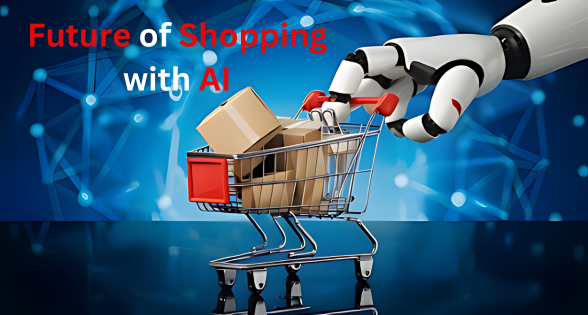
The eCommerce industry has seen rapid growth in recent years, and technology has played a significant role in this evolution. One of the most transformative technologies in this sector is Artificial Intelligence (AI). As an entrepreneur, understanding the impact of AI in eCommerce can help you stay ahead of the competition and deliver a superior customer experience. This guide will explore how AI is revolutionizing eCommerce, focusing on its benefits, applications, and future trends.
What is AI in eCommerce?
Artificial Intelligence (AI) refers to the ability of a computer or machine to mimic human intelligence and perform tasks that typically require human intervention. In the context of eCommerce, AI helps automate various processes, analyze large volumes of data, and provide personalized experiences for customers. By leveraging AI in eCommerce, businesses can optimize operations, increase sales, and improve customer satisfaction.
Why is AI in eCommerce Important?
AI in eCommerce is crucial because it offers several advantages that can transform how businesses operate. Here are some key reasons why AI in eCommerce is important:
- Personalization: AI enables eCommerce platforms to deliver personalized experiences by analyzing customer behavior and preferences. This allows businesses to recommend products that are more likely to interest individual customers, enhancing their shopping experience.
- Efficiency: AI automates repetitive tasks, such as inventory management, customer service, and order processing, freeing up human resources for more strategic activities. This results in increased efficiency and cost savings for businesses.
- Data Analysis: AI can quickly go through a lot of data and give businesses useful information. This helps companies understand trends and what customers like, so they can improve their marketing and products.
- Customer Support: AI-powered chatbots and virtual assistants can provide 24/7 customer support, answering queries and resolving issues promptly. This improves customer satisfaction and loyalty.
How is AI Transforming e-commerce?
AI is transforming eCommerce in numerous ways, and its applications are diverse. Let’s explore some of the most significant areas where AI in eCommerce is making an impact.
1. Personalization and Recommendations
One of the most popular applications of AI in eCommerce is personalization. AI algorithms analyze customer data, such as browsing history, purchase history, and preferences, to create personalized shopping experiences. By understanding what customers like, AI can recommend products that are more likely to interest them, increasing the chances of conversion. For example, when a customer visits an eCommerce site, AI can display personalized product recommendations based on their past behavior. This not only improves the shopping experience but also boosts the average order value.
2. Predictive Analytics
AI-powered predictive analytics tools help eCommerce businesses forecast demand, understand customer trends, and anticipate market changes. By analyzing historical data and identifying patterns, AI can predict which products will be popular and when demand will peak. This allows businesses to optimize their inventory levels, reduce waste, and ensure they have the right products in stock.
3. AI-Driven Customer Support
Customer support is a crucial part of any eCommerce business. AI-powered chatbots and virtual assistants can handle a wide range of customer inquiries, from answering simple questions to providing order status updates. By automating customer support, businesses can offer faster response times, reduce the workload on human agents, and improve customer satisfaction. AI chatbots are also capable of handling multiple languages and can be programmed to understand and respond to customer emotions, providing a more human-like interaction.
4. Fraud Detection and Prevention
Security is a major concern for eCommerce businesses, and AI plays a vital role in fraud detection and prevention. AI algorithms can analyze transaction patterns and detect unusual behavior that may indicate fraudulent activity. By identifying and flagging suspicious transactions in real-time, AI helps protect businesses and customers from fraud. AI also helps verify customer identities and process payments securely, ensuring that sensitive information is protected.
- Real-Time Analysis: AI can analyze vast amounts of data in real-time to detect fraudulent activities as they occur.
- Pattern Recognition: AI algorithms learn from past transactions to recognize and flag unusual patterns that may indicate fraud.
5. Dynamic Pricing
AI-powered dynamic pricing algorithms allow e-commerce businesses to adjust their prices in real-time based on market demand, competition, and other factors. By analyzing data such as competitor prices, customer behavior, and inventory levels, AI can optimize pricing strategies to maximize profits and attract customers.
- Competitive Analysis: AI monitors competitor prices to ensure that the business remains competitive.
- Demand Forecasting: AI predicts future demand to adjust prices accordingly, maximizing sales and profits.
6. Inventory Management
Effective inventory management is key to the success of any eCommerce business. AI can enhance this by predicting customer demand, optimizing inventory levels, and automating inventory tasks. By analyzing past sales data and market trends, AI can predict which products will be popular and when. This helps businesses manage their stock more efficiently, reducing the risks of overstocking or running out of items. AI-driven inventory systems can also automate the reordering process, ensuring that popular products are always available for customers.
7. AI-Enhanced Marketing Strategies
AI is also transforming how eCommerce businesses approach marketing. By analyzing customer data and behavior, AI can help create highly targeted and personalized marketing campaigns. This ensures that customers receive relevant messages that are tailored to their interests and needs, increasing the effectiveness of marketing efforts.
- Customer Segmentation: AI can analyze customer data to segment the audience based on demographics, behavior, and preferences, allowing for more targeted marketing.
- Content Optimization: AI tools can optimize content by analyzing customer interactions, ensuring that the most engaging and effective content is used in campaigns.
- Ad Placement: AI can determine the best platforms and times to place ads to maximize reach and conversion rates.
Future Trends of AI in eCommerce
The integration of AI in eCommerce is still evolving, and new trends are emerging that will shape the future of the industry. Here are some significant trends to watch:
1. Voice Commerce
Voice-activated assistants like Amazon’s Alexa and Google Assistant are becoming increasingly popular, and their integration with eCommerce platforms is on the rise. AI-driven voice commerce allows customers to search for products, place orders, and make payments using voice commands. As voice recognition technology improves, it is expected that more eCommerce businesses will adopt voice commerce, providing a convenient shopping experience for customers.
2. Visual Search
Visual search technology enables customers to search for products using images instead of text. AI algorithms analyze the visual elements of an image, such as color, shape, and texture, to find similar products.
- Enhanced User Experience: Visual search allows customers to find products easily by using images.
- Higher Conversion Rates: By enabling customers to find exactly what they are looking for, visual search can increase conversion rates.
3. Augmented Reality (AR)
Augmented Reality (AR) is another emerging trend in eCommerce, allowing customers to visualize products in their real-world environment before making a purchase. AI-powered AR applications enable customers to see how furniture will look in their homes or how clothes will fit their bodies. AR enhances the online shopping experience by providing a more interactive and immersive experience, reducing the need for physical stores and returns.
4. AI-Powered Content Creation
AI is also being used to automate content creation for eCommerce websites. AI-powered tools can generate product descriptions, blog posts, and marketing copy based on data and predefined templates. This saves time and ensures consistency in content quality. As AI technology evolves, it is expected that more eCommerce businesses will leverage AI for content creation, improving efficiency and reducing costs.
Challenges of Implementing AI in eCommerce
While AI has many benefits, using it in eCommerce can be tricky. Here are some common problems businesses might run into:
- Data Privacy: AI relies heavily on data, and ensuring the privacy and security of customer data is critical. Businesses must comply with data protection regulations and implement robust security measures.
- Cost: Implementing AI technology can be costly, especially for small businesses. The initial investment in AI tools and infrastructure may be a barrier for some companies.
- Technical Expertise: Developing and managing AI systems requires specialized technical skills. Businesses may need to hire experts or partner with AI solution providers to implement AI effectively.
- Integration: Integrating AI with existing eCommerce platforms and systems can be complex. Businesses must ensure that AI solutions are compatible with their current technology stack.
Designing an AI-Ready E-commerce System
To effectively leverage AI, businesses must focus on key areas:
- Data Management: AI thrives on data. Collect relevant customer data with consent, focusing on purchase histories, browsing behaviors, and demographics. Ensuring data is clean and secure is crucial, especially for new e-commerce businesses.
- Technical Expertise: Implementing AI requires specialized technical skills. Many business owners may not have the in-house capability to manage complex AI algorithms and integrate them into existing systems.
- Costs: AI implementation can be expensive, covering data acquisition, AI model development, and integration into e-commerce infrastructure.
- Security: Protecting customer data is essential to prevent breaches and maintain trust. Robust security measures and compliance with data privacy laws like GDPR and CCPA are vital.
Partnering with Experts
Collaborating with a leading e-commerce app development company can provide the expertise needed to integrate AI effectively. These companies can help create AI features like recommendation engines and chatbots while ensuring data security and compliance. They tailor solutions to fit your business needs, enhancing customer experiences and achieving your goals.
Addressing AI Concerns
- Data Risks: AI’s reliance on customer data requires strong security to avoid breaches. Prioritize encryption, access controls, and compliance with privacy laws.
- Employee Upskilling: AI can replace some jobs but also creates new roles in AI development and cybersecurity. Focus on upskilling employees to adapt to AI-driven changes.
Success Stories
- Netflix: Uses AI for personalized recommendations, keeping users engaged.
- Amazon: Adjusts prices in real-time with AI, boosting sales.
- Sephora: Allows virtual try-ons with AI, increasing sales and reducing returns.
- Alibaba: Uses AI chatbots for 24/7 customer service, improving satisfaction.
Preparing for AI
Data Collection: Gather customer data with consent, focusing on purchase histories, browsing behaviors, and demographics. Build secure data management systems.
Set Realistic Goals: Identify areas where AI can add value and set achievable goals.
Promote a Data-Driven Culture: Encourage the use of data for decision-making and educate teams on the benefits of AI.
Conclusion
AI in eCommerce is revolutionizing the way businesses operate, offering numerous benefits such as personalization, efficiency, and improved customer support. By leveraging AI, eCommerce businesses can optimize their operations, enhance customer experiences, and stay competitive in a rapidly evolving market. As an entrepreneur, understanding and embracing AI in eCommerce can give you a significant advantage. By staying informed about the latest trends and challenges, you can make informed decisions about implementing AI in your business. The future of eCommerce is undoubtedly intertwined with AI, and businesses that harness its power will be well-positioned for success.







